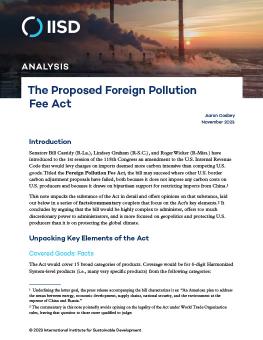
The Proposed Foreign Pollution Fee Act
The recent amendment to the U.S. Internal Revenue Code, the Foreign Pollution Fee Act, proposes charges on carbon-intensive imports. This analysis delves into the bill's details, expressing concerns about its complexity, excessive discretionary power, and a perceived emphasis on geopolitics over global climate protection.
-
Aaron Cosbey analyzes the proposed #ForeignPollution Fee Act, emphasizing its challenges in administration, the excessive discretionary powers, and its focus on geopolitical interests over global climate protection.
-
U.S. legislators aim to align #TradePolicy with climate goals through the Foreign Pollution Fee Act. However, @AaronCosbey's analysis highlights complexities, excessive discretion, and geopolitical priorities that could hinder its effectiveness in addressing global #climatechange.
-
With a focus on protecting U.S. producers, does the Foreign Pollution Fee Act truly prevent carbon leakage, or could it inadvertently hinder global efforts to mitigate climate change? @AaronCosbey unpacks the key elements of the Act.
In the realm of U.S. legislative initiatives addressing climate change and trade policy, Senators Bill Cassidy (R-La.), Lindsey Graham (R-S.C.), and Roger Wicker (R-Miss.) have introduced the Foreign Pollution Fee Act. This legislative proposal aims to levy charges on imports with higher carbon intensity than their U.S. counterparts. The bill has garnered attention for its potential to succeed where other border carbon adjustment proposals have faltered. However, this analysis reveals complex administrative challenges, broad discretionary powers, and a focus on geopolitical positioning and protecting domestic industries over global climate mitigation.
Participating experts
You might also be interested in
Adding Fuel to the Fire: How export restrictions can exacerbate climate change’s impacts on global food security
Higher temperatures will likely reduce agricultural yields and production in most countries, raising global food prices and worsening food security. Avoiding export restrictions is crucial.
Global Cooperation on Border Carbon Measures: Broaching the tough issues
The need for international cooperation on border carbon adjustment (BCA) is becoming increasingly urgent. What are the most difficult issues to overcome and what steps can we take toward resolving them?
IISD Annual Report 2023–2024
While IISD's reputation as a convenor, a trusted thought leader, and a go-to source on key issues within the sustainable development field is stronger than ever, the work happening outside the spotlight is just as valuable.
How Indonesia's Incoming President Can Advance the Transition to Clean Energy
With Prabowo Subianto inaugurated as Indonesia’s President, speculation abounds about the new administration’s commitment to the clean energy transition and climate targets, given Prabowo’s positioning as the “continuity candidate.” The question is, what, exactly, will be continued?